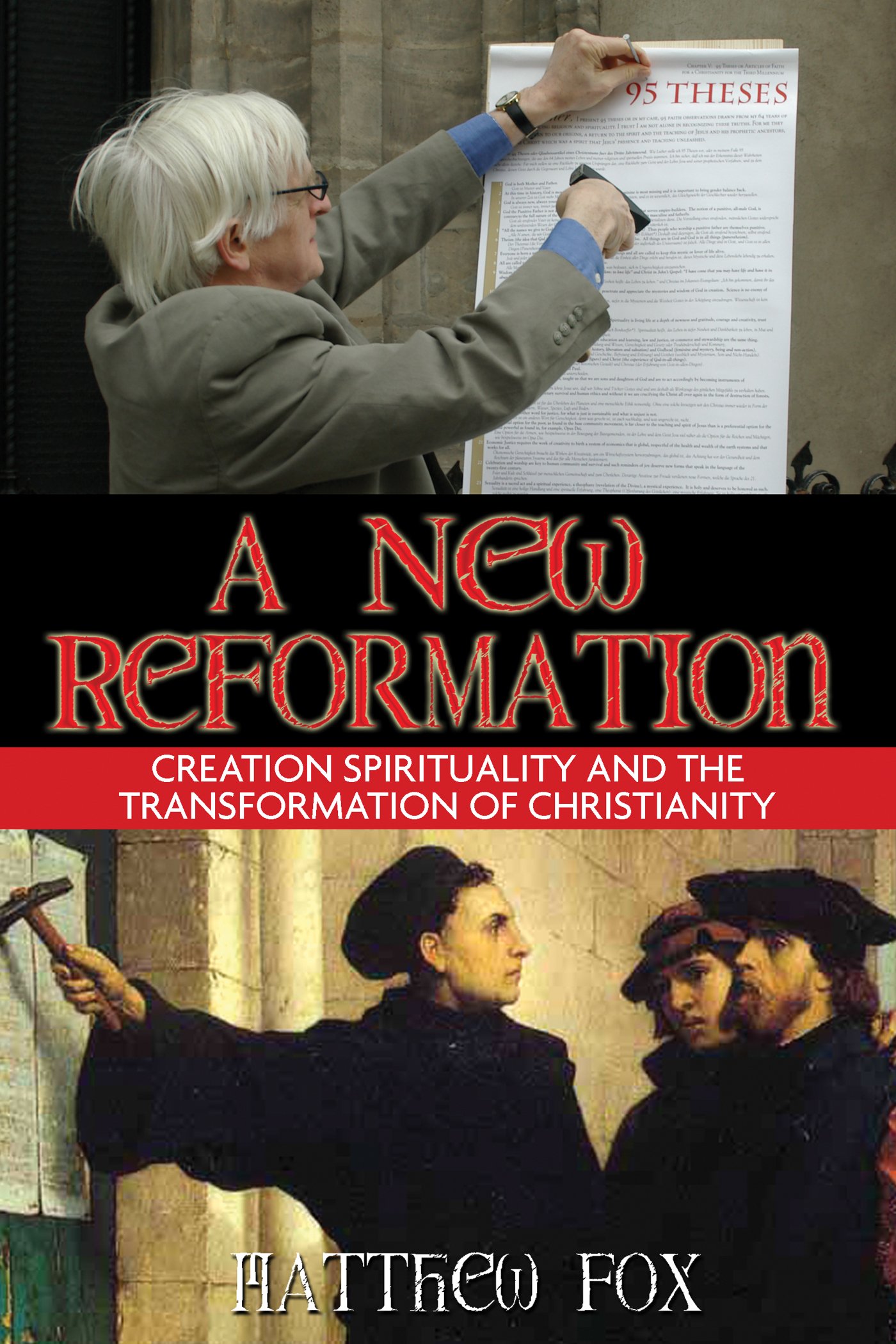Book review: A New Reformation
by Matthew Fox
★★★★★
Five centuries ago, a monk named Martin Luther revolutionized the Christian world. He devised a new vision of Christianity in 95 theses, and nailed these theses to the door of Castle Church in Wittenberg, Germany. The Reformation, as it came to be known, resulted in a schism between the Roman Catholics and what became known as Protestant Christianity.
Disgusted with the fundamentalist direction of the Catholic church (Matthew Fox was a member of the Dominican Order for thirty-four years before being expelled) and inspired by Luther’s movement, Fox decided to reenact Luther’s rebellion. His own resulting 95 theses are liberal and post-modern, reflecting a more pantheistic understanding of God over the “Punitive Father” of Catholic tradition. He then nailed these theses to the very same door. (Well, the door was no longer wooden, but metal, so he had to build a little wooden frame to nail his new Reformation.)
The gist of Fox’s Reformation is that the church needs to move away from religion, and toward spirituality. We have lost our appreciation and awe of creation (Fox is a long-time proponent of what he labels “Creation Spirituality.”) We would be better off without the doctrine of Original Sin, with its guilt-ridden baggage, embracing instead the Original Blessing, which recognizes awe as the starting point of true religion. There is no conflict between Fox’s version of Christianity and scientific discovery. No conflict with post-modern morality, granting equal respect and rights to women and to gays and lesbians.
A sampling of Fox’s 95 theses follows:
Number 6: Theism (the idea that God is “out there” or above and beyond the universe) is false. All things are in God and God is in all things.
Number 13: Spirituality and religion are not the same any more than education and learning, law and justice, or commerce and stewardship are the same.
Number 15: Christians must distinguish between Jesus (a historical figure) and Christ (the experience of God-in-all-things).
Number 36: Dance, whose root meaning in many indigenous cultures is the same as breath or spirit, is a very ancient and appropriate form in which to pray.
Number 59: Fourteen billion years of evolution and unfolding of the universe bespeak the intimate sacredness of all that is.
Number 75: Poverty for the many and luxury for the few are not right or sustainable.












 354 Circles
354 Circles
 603 Goodreads Friends & Fans
603 Goodreads Friends & Fans

 Hello! I'm an author, historical Jesus scholar, book reviewer, and liberal Christian, which means I appreciate and attempt to exercise the humanitarian teachings of Jesus without getting hung up on any particular supernatural or religious beliefs.
The Bible is a magnificent book that has inspired and spiritually fed generations for thousands of years, and each new century seems to bring a deeper understanding of life’s purpose. This is true of not only Christianity; through the years, our age-old religions are slowly transforming from superstitious rituals into humanitarian philosophies. In short, we are growing up, and I am thrilled to be riding the wave.
I avidly read all thought-provoking religion titles. New authors: I'd love to read and review your book!
Hello! I'm an author, historical Jesus scholar, book reviewer, and liberal Christian, which means I appreciate and attempt to exercise the humanitarian teachings of Jesus without getting hung up on any particular supernatural or religious beliefs.
The Bible is a magnificent book that has inspired and spiritually fed generations for thousands of years, and each new century seems to bring a deeper understanding of life’s purpose. This is true of not only Christianity; through the years, our age-old religions are slowly transforming from superstitious rituals into humanitarian philosophies. In short, we are growing up, and I am thrilled to be riding the wave.
I avidly read all thought-provoking religion titles. New authors: I'd love to read and review your book!
 Hi! While Lee writes the articles and reviews the books, I edit, organize, and maintain the blog. The views expressed here are Lee's but I'm his biggest supporter! :-)
Hi! While Lee writes the articles and reviews the books, I edit, organize, and maintain the blog. The views expressed here are Lee's but I'm his biggest supporter! :-)
Connect With Me!